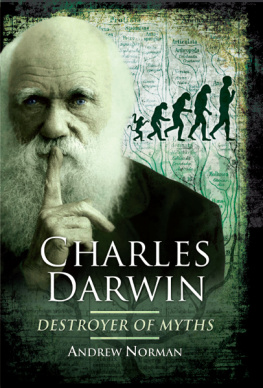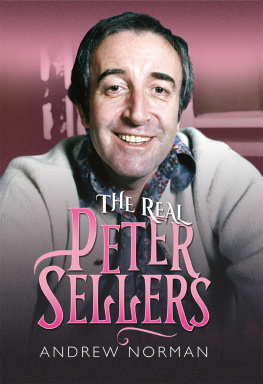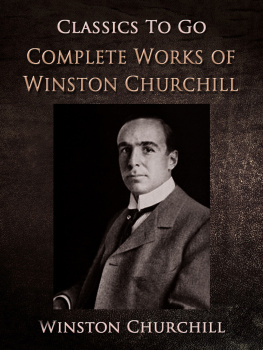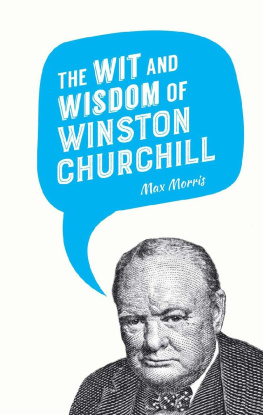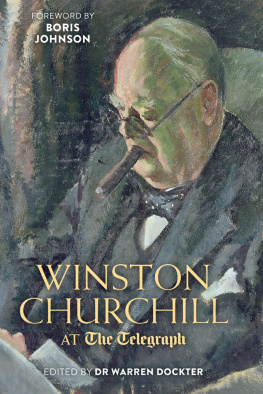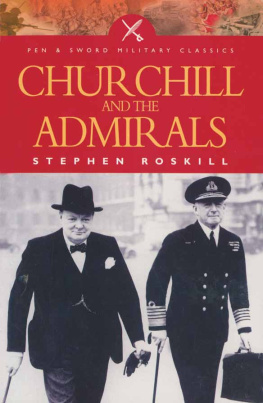Andrew Norman - Winston Churchill ; Portrait of an Unquiet mind
Here you can read online Andrew Norman - Winston Churchill ; Portrait of an Unquiet mind full text of the book (entire story) in english for free. Download pdf and epub, get meaning, cover and reviews about this ebook. year: 2012, publisher: Pen & Sword Books, genre: Non-fiction. Description of the work, (preface) as well as reviews are available. Best literature library LitArk.com created for fans of good reading and offers a wide selection of genres:
Romance novel
Science fiction
Adventure
Detective
Science
History
Home and family
Prose
Art
Politics
Computer
Non-fiction
Religion
Business
Children
Humor
Choose a favorite category and find really read worthwhile books. Enjoy immersion in the world of imagination, feel the emotions of the characters or learn something new for yourself, make an fascinating discovery.
- Book:Winston Churchill ; Portrait of an Unquiet mind
- Author:
- Publisher:Pen & Sword Books
- Genre:
- Year:2012
- Rating:3 / 5
- Favourites:Add to favourites
- Your mark:
- 60
- 1
- 2
- 3
- 4
- 5
Winston Churchill ; Portrait of an Unquiet mind: summary, description and annotation
We offer to read an annotation, description, summary or preface (depends on what the author of the book "Winston Churchill ; Portrait of an Unquiet mind" wrote himself). If you haven't found the necessary information about the book — write in the comments, we will try to find it.
Winston Churchill ; Portrait of an Unquiet mind — read online for free the complete book (whole text) full work
Below is the text of the book, divided by pages. System saving the place of the last page read, allows you to conveniently read the book "Winston Churchill ; Portrait of an Unquiet mind" online for free, without having to search again every time where you left off. Put a bookmark, and you can go to the page where you finished reading at any time.
Font size:
Interval:
Bookmark:

L ord Alexander, Rita M. Bosworth, David Cooper, Nicholas Dragffy, John Forster, John Gill, Irene Heath, Caroline Herbert, Dr Elbushra Herieka, Nicola Hilton, His Grace the Duke of Marlborough, Isabel Herieka, Nicola Hilton, His Grace the Duke of Marlborough, Isabel McMann, Lord Moran, Katherine Thomson, Karen Wiseman.
Churchill Archives Centre, Churchill College, Cambridge, UK; City of London Cemetery and Crematorium; Elstree School, Woolhampton, Berkshire; Harrow School; Oxford University Archives, Bodleian Library, Oxford; Poole Central Library; Poole Hospital Library; Radcliffe Science Library, Oxford. I am most grateful to Tarka King for allowing me access to the Tara King Papers, and to Leonie and Luiz Monteiro de Barros for kindly transcribing them for me.
I am enormously indebted, as ever, to my beloved wife Rachel.
By the same author:
HMS Hood: Pride of the Royal Navy, Stackpole Books, Mechanicsburg, PA, USA, 2001
By Swords Divided: Corfe Castle in the Civil War , Halsgrove, Tiverton, 2003
Thomas Hardy: Behind the Inscrutable Smile , Halsgrove, Tiverton, 2003
Tyneham: The Lost Village of Dorset , Halsgrove, Tiverton, 2003
T E Lawrence: Unravelling the Enigma , Halsgrove, Tiverton, 2003
Sir Francis Drake: Behind the Pirates Mask , Halsgrove, Tiverton, 2004
Dunshay: Reflections on a Dorset Manor House , Halsgrove, Tiverton, 2004
Robert Mugabe and the Betrayal of Zimbabwe , McFarland & Company Inc., Jefferson, NC, USA, 2004
Enid Blyton and her Enchantment with Dorset , Halsgrove, Tiverton, 2005
Thomas Hardy: Christmas Carollings , Halsgrove, Tiverton, 2005
Adolf Hitler: The Final Analysis , Spellmount, Staplehurst, 2005
Agatha Christie: The Finished Portrait , Tempus Publishing, Stroud, 2007
Mugabe: Teacher, Revolutionary, Tyrant , The History Press, Stroud, 2008
The Story of George Loveless and the Tolpuddle Martyrs , Halsgrove, Tiverton, 2008
Agatha Christie: The Pitkin Guide , Pitkin Publishing, 2009
Purbeck Personalities , Halsgrove, Tiverton, 2009
Arthur Conan Doyle: The Man behind Sherlock Holmes , The History Press, Stroud, 2009
Father of the Blind: A Portrait of Sir Arthur Pearson , The History Press, Stroud, 2009
Jane Austen: An Unrequited Love, The History Press, Stroud, 2009
Bournemouths Founders and Famous Visitors , The History Press, Stroud, 2010
Hitler: Dictator or Puppet? , Pen and Sword Books, Barnsley, 2011
An article may be viewed on the website of the Churchill Centre and Museum at the Churchill War Rooms, London, by John H Mather, MD, which is entitled, Lord Randolph Churchill: Maladies Et Mort. Extracts from that article are given below, followed by the authors comments in italics (preceded by A.N.). The article begins as follows:
i It is impossible to say at this late date what killed Sir Winston Churchills father. But it is no longer possible to say that he died of syphilis.
A.N. Is this statement true? See below.
ii Against their doctors advice, Lord and Lady Randolph made a world tour in 1894 which was cut short by his rapidly deteriorating health. He returned to England in late 1894, as weak and helpless in mind and body as a little child, according to his son and biographer, Winston.
A.N. Correct.
iii Lord Randolph was seriously ill in 1890, with palpitations associated with exhaustion. His family physician, Dr Robson Roose, prescribed belladonna, laudanum and digitalis. The following year, he experienced an episode of severe confusion, which suggests acute high blood pressure.
A.N. Dr Mathers suggestion that Lord Randolph suffered from high blood pressure is pure speculation.
iv Earlier, in 1882, he had had an extended illness which Lady Randolphs diary refers to as tiredness and fevers. Later, in mid 1893, Dr Roose told Jennie, who was distraught over her husbands illness, that Randolphs heart condition had, nonetheless, been cured. But, around this time, Randolph began to have speaking difficulties which were associated with hearing and balance problems.
Over the next two years until his death in 1895, Lord Randolph complained of dizziness, palpitations, and intermittent numbness in his hands and feet.
A.N. The probable cause of this numbness of the extremities is syphilitic degeneration of those neurons in the spinal cord which carry sensory information to the brain (a condition known as tabes dorsalis), which occurs in tertiary (untreated), syphilis, and becomes manifest ten to twenty-five years after the primary infection. In addition, on 4 November 1894, Dr Keith described Lord Randolphs gait as staggering and uncertain, this being another classic feature of tabes dorsalis.
v His speech became more slurred, and during one of his last parliamentary speeches, he hesitated on the text. He eventually became quick-tempered and combative. Finally, he died in a coma, with pneumonia and, probably, kidney failure.
His biographers, including his son Winston, were divided on the nature of Lord Randolphs medical problems and the cause of his death. They have generally attributed his deterioration and death to syphilis (Winston in conversation, though not in print) and its late effects.
A.N. This paragraph is ambiguous. Winston was not divided. He was in no doubt whatsoever that his father had suffered from syphilis , viz: a) His letter to Lady Randolph of 2 November 1894, where he states, I asked Dr Roose and he told me everything and showed me the medical reports. I have told no one .
vi Some have suggested other neurological conditions, such as epilepsy, multiple sclerosis, amyotrophic lateral sclerosis (Lou Gehrigs disease), chronic alcoholism or a brain tumour.
A.N. Why introduce red herrings such as these when Lord Randolphs symptoms can be accounted for by the presence of syphilis?
vii The dramatic deterioration in his health and the various descriptions of his behaviour in his last three years might support a diagnosis of dementia paralytica [a term which is synonymous with General Paralysis of the Insane] in late or tertiary syphilis, which affects the brain and appears ten to twenty years after the primary infection.
A.N. Agreed.
viii This would likely have affected Jennie and their two sons, Winston and Jack.
A.N. No, because assuming, as all the evidence suggests, that Lord Randolph had contracted syphilis whilst at Oxford (1867-1870), by the time he married Jennie and his children were born, the disease would have progressed to a non-infectious phase. (The current view is that a patient infected with syphilis remains infectious for up to two years from the time he develops the primary lesions, or chancre i.e., during the primary, secondary, and early latent phase of syphilis.)
ix But if a diagnosis of advanced syphilis is to be accepted, there must have been an initial infection.
A.N. Agreed and there was.
x There has been considerable speculation about when Randolph might have become infected. The most notorious account is by journalist Frank Harris in his 1924 autobiography, My Life and Loves , who recounts a story told by Louis Jennings, Randolphs friend and political colleague, who had published Randolphs 1880-88 speeches.
A.N. The use by Dr Mather of the word notorious suggests that he has closed his mind to the possibility that Harris may have been telling the truth.
xi After a drunken party, Jennings said, fellow students put Randolph with an old hag. The next morning he woke, discovered his situation, threw money at the woman and fled. He was immediately treated by a local doctor with disinfectant. Eventually, a little, round, very red pimple appeared on his peccant member. (This is not the description of a primary syphilis chancre, but of herpes.)
Font size:
Interval:
Bookmark:
Similar books «Winston Churchill ; Portrait of an Unquiet mind»
Look at similar books to Winston Churchill ; Portrait of an Unquiet mind. We have selected literature similar in name and meaning in the hope of providing readers with more options to find new, interesting, not yet read works.
Discussion, reviews of the book Winston Churchill ; Portrait of an Unquiet mind and just readers' own opinions. Leave your comments, write what you think about the work, its meaning or the main characters. Specify what exactly you liked and what you didn't like, and why you think so.


